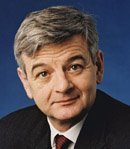Another great source
Jim Lerch found another gem on the Internet. It's Project Syndicate. As a source for global op-ed articles, it's first rate.I'd suggest that Project Syndicate would be a source for good material for many social studies courses, not just comparative politics.
I have bookmarked this site and plan to make it a regular stop on my routine Web trips.
Here' how the people running the project describe it:
"Project Syndicate is a non-profit international association of 275 quality newspapers in 115 countries devoted to:
- "bringing distinguished voices from across the world to local audiences everywhere;
- "strengthening the independence of printed media in transition and developing countries;
- "upgrading their journalistic, editorial, and business capacities.
"Financial contributions from member papers in developed countries support the services provided free by Project Syndicate to members in less advanced economies. Additional support comes from the Open Society Institute, Politiken Foundation and Die Zeit Ebelin und Gerd Bucerius Foundation.
"Each year, Project Syndicate delivers hundreds of commentaries by prominent figures to the world's foremost newspapers.
"All commentaries are written by men and women who deserve to be heard by a global audience and who [come from] an endless variety of professions, national and cultural backgrounds, and political perspectives."
Recent contributors have included:

- Joschka Fischer, Green Party leader and German Foreign Minister and Vice Chancellor from 1998 to 2005.
- Jeffrey Sachs, Professor of Economics and Director of the Earth Institute at Columbia University and adviser to the governments of Poland, Russia, and other countries.
- Ralf Dahrendorf, former European Commissioner from Germany, a member of the British House of Lords, a former Rector of the London School of Economics, and a former Warden of St. Antony's College, Oxford.
- J. Bradford DeLong, Professor of Economics at the University of California at Berkeley and a former Assistant US Treasury Secretary.
- Peter Singer, Professor of Bioethics at Princeton University.
- Joseph E. Stiglitz, a Nobel laureate in economics, Professor of Economics at Columbia University, formerly Chairman of the Council of Economic Advisers to President Clinton and Chief Economist and Senior Vice President at the World Bank.
The commentaries are organized in three main areas:
- Global Perspectives ("Frontiers of Growth," "Human Rights," "Worldly Philosophers," and "Islam and the World")
- International Insight ("European Economies," "A Window on Russia," "China Stands Up," Latin America," "Into Africa," and "The Asian Century")
- Mind and Matter ("Health and Medicine" and "Science and Society")



1 Comments:
Here's an example of a possibly-useful article I found at Project Syndicate.
The Fragility of a Flat World
by Joseph S. Nye, Distinguished Service Professor at Harvard’s Kennedy School of Government and author, most recently, of The Power Game: A Washington Novel
The world is flat! So says the columnist Thomas Friedman...
Skeptics have pointed to the limits of Friedman’s metaphor. As one put it, the world is not flat, but “spiky.” A contour map of economic activity in the world would show mountains of prosperity and many ravines of deprivation. Moreover, distance is far from dead. Even neighbors with low tariff barriers, like Canada and the United States, trade more internally than across borders. Seattle and Vancouver are close geographically, but Vancouver trades more with distant Toronto than with nearby Seattle...
But flattening is reversible. It has happened before. The world economy was highly integrated in 1914, but economic interdependence declined during the next three decades. The global economy did not recover that same level of integration until 1970, and even then it remained divided by the Iron Curtain...
World War I was the trigger that set off the reversal... Politics did not keep pace...
Some analysts see China playing a role today similar to Germany’s role in the twentieth century. A rising power, beset with internal inequality, turns to nationalism and challenges the dominant power, provoking a war that turns back the progress of economic globalization. While the American and Chinese economies are highly interdependent today, so, too, were Germany and Britain before 1914...
The greater threat to a flat world is likely to come from the non-state and transnational forces that have been unleashed by the diffusion of technology...
Globalization has two driving forces: technology and policy. Thus far, policy has reinforced the flattening effects of technology. As the world’s largest economy, the US has taken the lead in promoting policies that reduce barriers. But the events described above could reverse such policies.
Some critics of globalization might welcome such an outcome. But the result, as we saw after 1914, would be the worst of both worlds – reversal of the economic globalization that spreads technology and power, but reinforcement of negative dimensions of military and ecological globalization, such as war, terror, climate change, and the spread of infectious diseases. In that case, the flat world could become a desert.
Post a Comment
<< Home